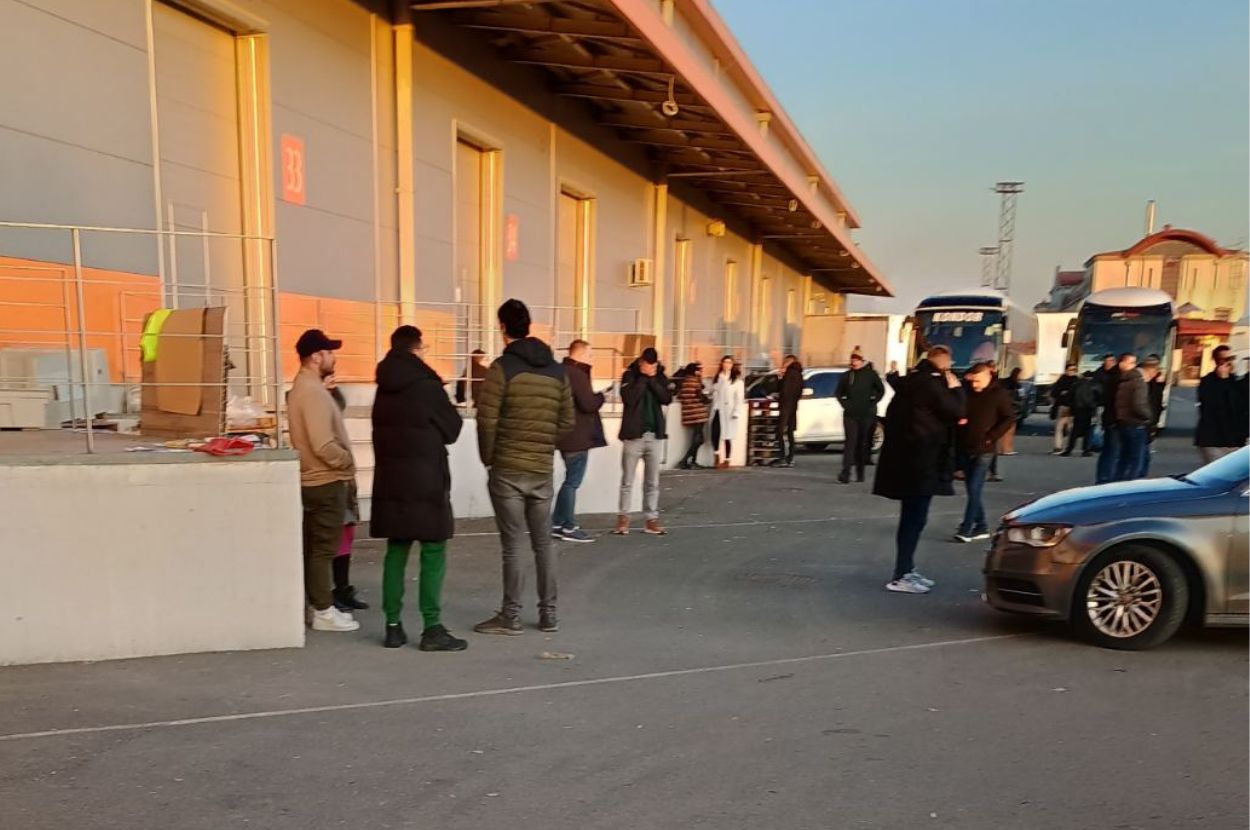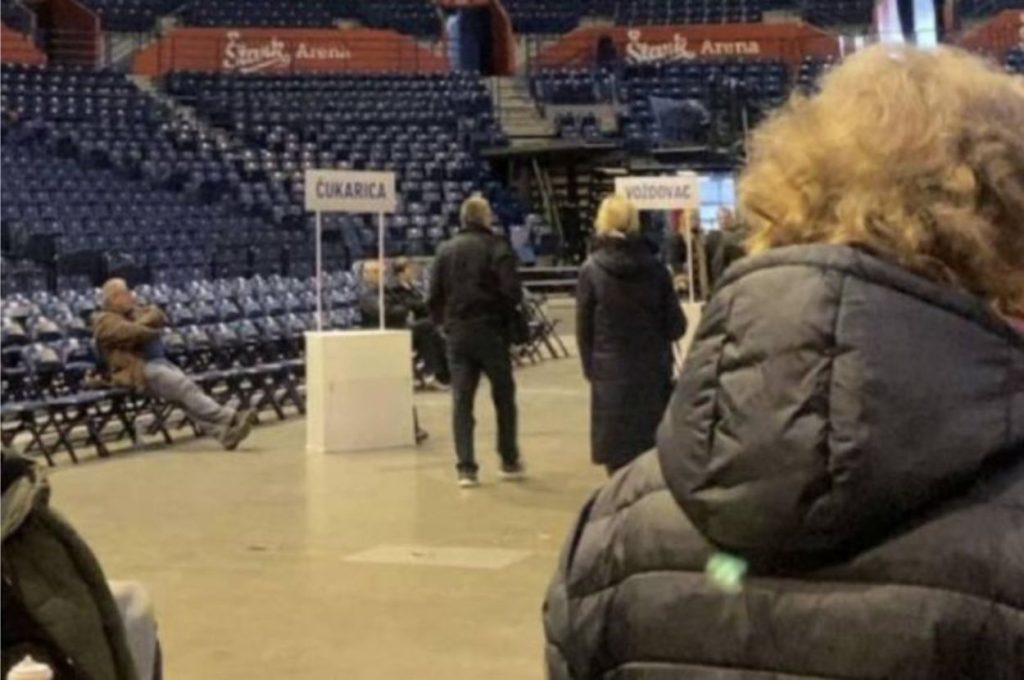Elections and spin (Part 1): When you get caught cheating, shift the blame to autochauvinists
December 17th has passed, and the celebration at the Serbian Progressive Party’s headquarters is over. The Progressives have scored another election victory, while the opposition, some media, and domestic and international observers have pointed out a series of irregularities and manipulations in the electoral process. One of these involved bringing in voters from Bosnia and Herzegovina to vote in the local elections in Belgrade. The state leadership responded with a spin, and reports of organized voter migrations were immediately portrayed as targeted attacks on the citizens of the Republic of Srpska. This solidified the foundations of a parallel reality – one created by manipulations in the public sphere throughout the entire election campaign.
On election day, when reports spread through the media and social networks about organized transport of voters from Bosnia and Herzegovina to vote in the Belgrade elections, Prime Minister Ana Brnabić made a statement. Commenting on a video showing buses in front of the Belgrade “Štark” Arena, Brnabić posted on the social network “X” that there were no irregularities or illegal activities. She stated that “people, our citizens, registered in the voter registry, are coming in an organized manner to vote at places where the opposition has 80% of the controllers plus 5,600 international observers”.
“No one can vote without a valid document and if they are not on the voter registry. Spreading half-truths to create chaos. And this has been going on all day”, added the Prime Minister, addressing the “gentlemen from Šolak’s media”.
Her statement served as an introduction to all subsequent responses from government representatives following the elections, which were directly related to illegal and illegitimate practices such as organized voter migrations.
Autochauvinists are leading a terrible campaign against our sisters and brothers
On election night, after announcing the preliminary results of the parliamentary, provincial, and local elections to the public, Serbian President Aleksandar Vučić framed the initial reports of voters being brought in from the Republic of Srpska as “condemnation” and “threats to our people west of the Drina and Danube”.
“Particularly painful for me were the lies and threats directed at people from the Republic of Srpska, our people west of the Drina and Danube. It’s something terrifying. Because there is almost no real change in the number of votes, nor does it decide anything of great importance. But symbolically, it is very important, and for no reason, you have attacked people because of a false polling station, which you invented yourselves. You have condemned our entire people. They say, who is transporting them? Well, transporting someone is not a criminal act. Today, we had, I don’t know how many cars, for anyone who needed it, any mother, grandmother, aunt… We helped everyone to get to the polls. That is the job of a political party participating in the elections. What does that have to do with the polling station? Only those who are registered in the voter registry can come to the polling station, and only they can vote”, said Vučić.
Thus, by December 17th, the transport of voters with fictitious residences was framed as “helping the people to get to the polls”, and any indication of manipulation of the voter registry and altering the electoral will of Belgrade’s citizens was interpreted as an attack on the citizens of the Republic of Srpska.

Due to these alleged attacks, Miloš Vučević, the president of the Serbian Progressive Party and Minister of Defense, issued an apology to the voters from the Republic of Srpska.
“I have two messages – first and foremost, I apologize to the Serbs from Kosovo and Metohija and the Republic of Srpska, Bosnia and Herzegovina, for the insults that some people, unfortunately irresponsible people, autochauvinists, people who hate everything Serbian and unfortunately every Serb, have uttered on social networks. You are always welcome, especially Serbs from Kosovo and Metohija, who are an inseparable part of Serbia, and Serbs from the Republic of Srpska are also an inseparable part of our nation. It has been like this, it is like this, and it will be like this forever. They have the right to vote – I am speaking indisputably about the citizens of Kosovo and Metohija, and as for the Republic of Srpska, all those with dual citizenship have the right to vote, and that is allowed, defined by law, the constitution, and the law at the time for those who criticized it today”, Vučević stated in the morning program of TV Prva.
The insults that Vučević spoke about had overnight transformed into a “terrible campaign against our sisters and brothers” even appearing on the Instagram account of the President of Serbia. As a result, Vučić decided to issue an apology as well.
View this post on Instagram
“Dear citizens of Republika Srpska, for the first time in my life, I address you on behalf of the Serbian people and all citizens of Serbia. I want to apologize to you for the terrible campaign that a part of the political public in Belgrade is waging against you, our sisters and brothers. (…) I want to apologize to you and to say that the majority of Serbia, the Serbian people, love Republika Srpska, always respecting Bosnia and Herzegovina. We love Republika Srpska, we will never abandon our people, and we will always stand by you. We will not run away or hide from those who want to drive a wedge between us”, said the President of Serbia, adding that he will defend the electoral will of the people.
Spin knows no boundaries
Justifications for organized voter migrations have also come from Republika Srpska. The President of this entity within Bosnia and Herzegovina, Milorad Dodik, stated on his social media account that “slandering” Serbs from Republika Srpska indicates “collusion” between the election losers in Serbia and “foreign anti-Serbian forces”. Dodik reiterated that voting in Serbian elections is a legally guaranteed right for citizens of Republika Srpska and aims to prevent “anti-Serbian lackeys” from coming to power in Serbia.
Alongside messages asserting that everything was lawful and that the accusations were merely attacks on Serbs from Bosnia and Herzegovina, assurances came from the top that the number of voters from Republika Srpska could not have significantly influenced the election results in Serbia. As evidence supporting this argument, Prime Minister Ana Brnabić cited the number of people who crossed the border between Serbia and Bosnia and Herzegovina on election day.
“Throughout that day on December 17th, 20,368 people crossed the border. Among them were foreigners, many of whom are not our citizens, and many were children. So, you understand that this has nothing to do with anything”, emphasized Brnabić.
What is behind the spin curtain?
The spin about alleged hatred towards citizens of Republika Srpska was a safer option for government representatives than answering numerous questions regarding the electoral process, specifically about voters who apparently do not reside in Belgrade but played a decisive role in determining its leadership.
As Istinomer has reported, the CRTA Observation Mission presented a preliminary analysis to the public shortly after the elections. The analysis focused on organized voter migrations aimed at influencing the outcomes of local elections in selected cities and municipalities. CRTA also explained that this practice involved fictitious residences, specifically manipulating the voter registry through mass registrations of citizens at addresses where they do not actually reside.
What are organized voter migrations?
Organized voter migrations involve voters coordinating to temporarily change their residence to influence voting outcomes in another city or municipality. According to the analysis by CRTA’s observation mission during the 2023 elections, this practice was used to significantly impact the results of local elections in specific cities and municipalities in Serbia.
CRTA emphasizes that this practice is neither legal nor legitimate. Registering fictitious residences to exercise voting rights in local government units where voters do not actually reside contradicts Serbian law, which governs the residency of citizens.
Due to this type of illegal electoral engineering, along with the extent and diversity of other electoral abuses in Belgrade, the CRTA Observation Mission maintained its stance that the results of the Belgrade elections do not reflect the freely expressed will of its residents.
Istinomer continued to investigate electoral manipulations. Upon obtaining a database that shows the number of voters registered at each address for the Belgrade elections, we discovered locations with suspiciously high numbers of registered voters. For instance, when checking just one polling station in Voždovac, Istinomer found five addresses or properties where an unusually large number of voters were registered.

Based on data published by Istinomer, information available on the website of the Ministry of Public Administration and Local Self-Government, as well as input from citizens, CRTA conducted additional analyses. According to their findings, these analyses led to new conclusions that confirm and strengthen suspicions of serious manipulation of the voter registry aimed at influencing the will of voters in the Belgrade local elections.
CRTA determined that at the address Danijelova 9, where an unfinished building is located, 129 voters were registered. According to CRTA’s analysis, a significant number of these voters were registered solely for the purpose of voting in the Belgrade elections. For parliamentary elections, they were found registered at various polling stations in Bosnia and Herzegovina, including Višegrad, Bijeljina, Zvornik, Lopare, Pale, Novo Goražde, Banja Luka, and Sarajevo. CRTA’s findings also highlight additional information that raises concerns about the integrity of the electoral process.
The analysis on CRTA’s website states that “the suspicion of illegal and illegitimate electoral engineering is particularly highlighted by the fact that 96% of voters from Danijelova 9 did not have residency in Belgrade or Serbia before the April 2022 elections. All obtained the right to vote in the local elections in Belgrade between January and April 2022, as concluded from the voter list for the 2022 referendum”. The analysis also noted that the Serbian Progressive Party’s results at the polling station, including Danijelova 9, were ‘significantly better compared to surrounding polling stations.

